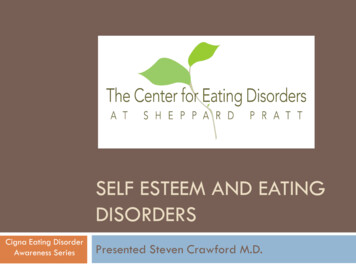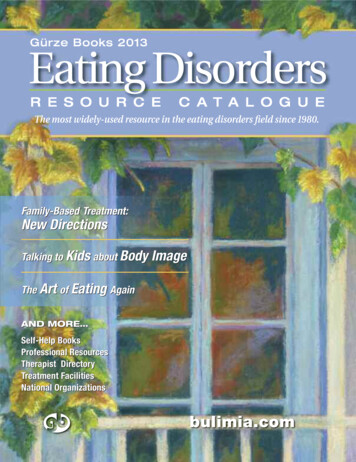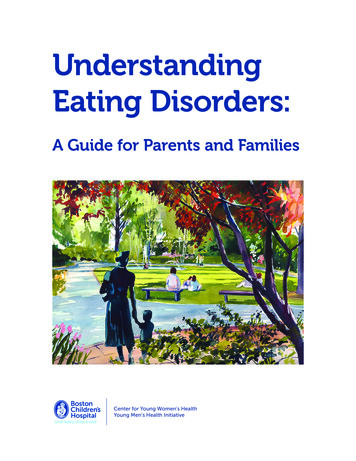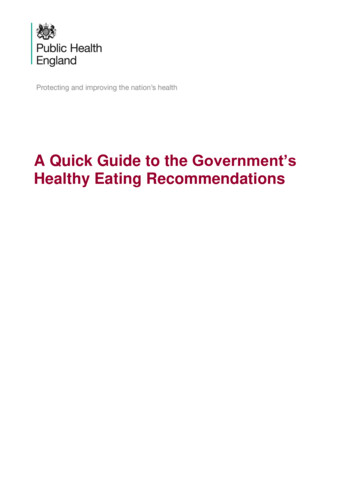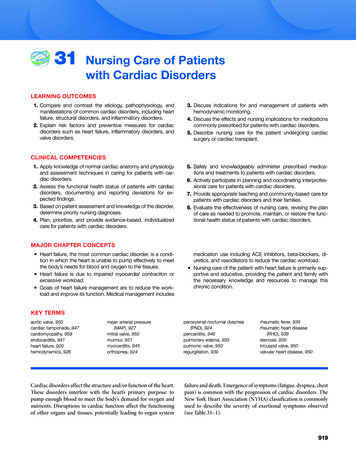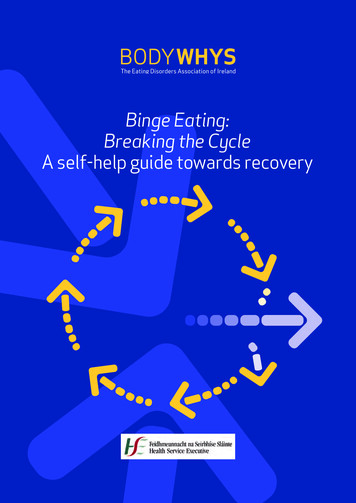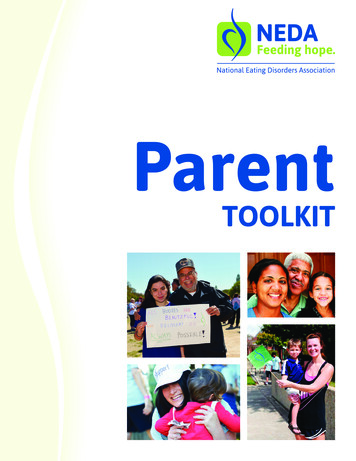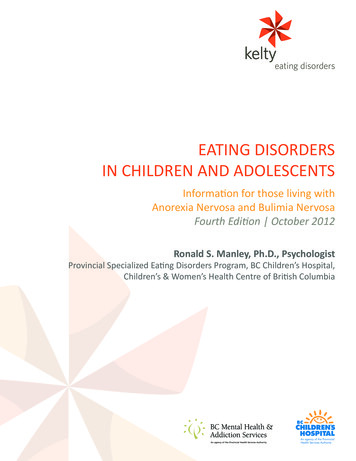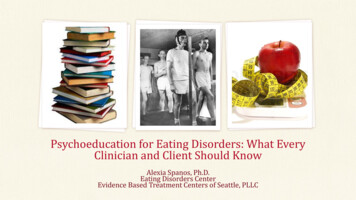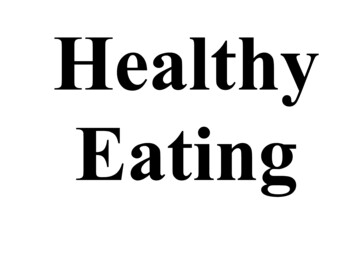
Transcription
EatingDisorders
Anorexia NervosaSomeone with this condition may be intensely afraid of beingoverweight and claim to feel fat even if they are severelyunderweight. They might reject food entirely, vomit to be rid ofthe food, and exercise to the extreme to achieve thinness.
BulimiaSomeone with bulimia may vomit intentionally, or use laxativesto rid the body of food. Often bulimics will ingest hugeamounts of food (binge) before vomiting or they may alternatebingeing with severe dieting. A bulimic is not necessarilyoverweight or underweight.
Compulsive OvereatingSomeone is said to be a compulsive overeater if they eatexcessive amounts of food for reasons other than physicalhunger. Compulsive eaters may feel a lack of control aboutfood, and continue to eat even when they feel extremelyuncomfortable.
Chronic dietingSomeone who continually tries to lose weight by dieting is a chronicdieter. This person will go from one diet to another and isparticularly vulnerable to quick weight loss gimmicks. Becausedieting lowers body metabolism, a return to normal eating causesweight to be regained, leading to a sense of failure and the start ofanother diet.
Why do eating disorders happen?Problem eating patterns develop for a variety of reasonsincluding: fear of weight gain family problems anxiety about sexuality pressure to succeed and fear of failure societal pressures self esteem issues physical, emotional, and psychological issues there can be many other causes that contribute to why theyhappen
Signs Include frequent changes in, and constant talking about, weight preoccupation with food, nutrition or dieting severe weight loss or dramatic weight fluctuations unhealthy appearance, with pale face and limp hair wearing layers of clothing or baggy, loose-fittingclothes complaining frequently of the cold fainting, blacking out, dizzy spells or difficultyconcentrating seeming sad, angry or irritable isolating from others frequent trips to the restroom taking long, frequent showers skipping meals cutting food into small pieces, or eating large quantitiesof food
For more information or help:University HealthServices150 Infirmary Way(413)577-5101Services include: nutritionist andhealth/dietprograms eating disorderclinics thatcombine nutrition,counseling andmedical careCounseling ServicesEverywoman’sCenterWilder Hall(413)545-0883Services include: Short termcounseling for women Free and available toall campus,community, and 5college womenWalden BehavioralClinic109 Main StreetNorthampton Ma 01060(413)582-0100Services include: Inpatient care Partial hospitalization Intensive outpatientcare Binge and/or nighteating programs
Average woman vs. Barbie Doll?Average womanBarbieStore mannequinHeight5' 4"6' 0"6' 0"Weight145 lbs101 lbsNot availableDress Size11-1446Bust36 - 37"39"34"Waist29 - 31"19"23"Hips40 - 42"33"34"
What is Healthy Eating?Aiming for regular meals and healthy snacks(when you are hungry or need extra energy)Eating foods from all of the food groups(grains, fruits, vegetables, proteins, dairyproteins, and healthy fats) each dayBalancing nutrient-rich foods with moderateamounts of other foods, such as sweets orfast foodsEating when hungry and stopping when full
10 Healthy Eating Tipsfor the College Student***http://healthed.uoregon.edu/10tips.htm1. Eata good breakfast. Studies show thatskipping breakfast detracts from scholastic achievement. When there isn'ttime to sit down and enjoy your morning meal, grab a bagel, piece of fruit,and some juice. Most of these items can be easily stored in your dormroom.
2. Ifyou must eat fast foods, choosewisely. Choose pizza with half the cheese, a regular size roast beefsandwich, baked potato, or green salad with reduced calorie dressing.Limit high fats like french fries, fried chicken or fish sandwiches andwatch out for salad dressing.3. Keephealthful snacks on hand so ifhunger strikes during a late night study session, you won’t be tempted byvending machine candy, chips, or ice cream. Possibilities include fresh ordried fruit, pretzels, unbuttered popcorn, rice cakes or whole wheatcrackers. If you have a refrigerator, consider raw vegetables with low-fatyogurt or cottage cheese dip.
4.Eat of foods rich in calcium. People intheir early twenties need to build up stores of calcium in their bodies toprevent osteoporosis in later life. If you don’t like milk, try to includeample amounts of low-fat yogurt, low-fat cheese, and green leafyvegetables in your diet.5. Ifyou need to lose weight, do itsensibly. Starvation and/or diets that offer a quick fix usuallybackfire and are harmful. There is not truth to the theories that suggesteating foods in any particular combination will promote weight loss. Theonly safe way to lose weight, feel good while doing it, and keep it off is toeat a balanced diet.
6. Sugarprovides calories in your diet but fewother nutrients and it contributes significantly to tooth decay. Use itsparingly and consider sweetening coffee, tea, cereal and fruit with dietsweeteners instead.7. Thedining hall salad bar can beeither an asset or a detriment to you diet depending on how you choosefrom it. Of course, leafy greens, raw vegetable and fresh fruit arebeneficial. But if you choose lot of creamy dressing, bacon bits, andmayonnaise based salads, the calories and fat may equal or even exceedthose of a burger and fries.
8. Ifyou drink alcohol, keep in mind that itsupplies calories but no nutritional value. A light beer, a glass of wine, oran ounce of liquor each has about 100 calories. There are also many healthproblems associated with drinking alcohol.9. Drinklots of water. Your body needs at leasteight glasses a day, and if you exercise vigorously, you may need more.To remind yourself, carry a water bottle along to class and keep it handyduring late night study sessions.
10. Remember,food is a lot morethan nourishment for our bodies.Enjoy and savor it.
Information provided by:The National Eating Disorders Association (NEDA) is a non-profit organization dedicated to supportingindividuals and families affected by eating disorders. They campaign for prevention, improved access to qualitytreatment, and increased research funding to better understand and treat eating disorders. They work withpartners and volunteers to develop programs and tools to help everyone who seeks assistance.For more information visit: www.nationaleatingdisorders.orgHere are links to NEDA’s add campaign to use as loads/file/NEDA%20Final%20print%20sp sorders.org/uploads/file/NEDA%20Final%20print%20sp ers.org/about-us/index.phpThis bulletin board is brought to you by:Everywoman’s Centervisit us at: www.umass.edu/mycenter
dieter. This person will go from one diet to another and is particularly vulnerable to quick weight loss gimmicks. Because dieting lowers body metabolism, a return to normal eating causes weight to be regained, leading to a sense o
